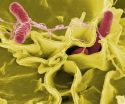Extreme heat and precipitation are increasing Salmonella infections, UMD study shows
Coastal communities are most vulnerable
2015-07-01
(Press-News.org) College Park, Md. -- Extreme heat and precipitation events, which are expected to increase in frequency and intensity due to climate change, are associated with increased risk of Salmonella infections, according to a study led by researchers from the University of Maryland School of Public Health. The study is the first to provide empirical evidence that Salmonella infections related to extreme weather events are disproportionately impacting those living in the coastal areas of Maryland.
"We found that extremely hot days and periods of extreme rainfall are contributing to Salmonella infections in Maryland, with the most dramatic impacts being seen in the coastal communities," said Dr. Amir Sapkota, associate professor in the Maryland Institute for Applied Environmental Health. "As we prepare for the future, we need to take this differential burden into account."
Salmonella, a group of food- and waterborne bacteria, is commonly found in raw poultry, eggs, beef, and unwashed produce. Salmonella causes an estimated 1.2 million cases of acute gastroenteritis (aka "stomach flu," with symptoms including diarrhea, fever, vomiting and abdominal cramps) in the United States each year. In Maryland, more than 9,500 cases of Salmonella infections (confirmed by cultures) were reported to the health department between 2002 and 2012. Past studies have suggested a connection between weather (temperature and rainfall) and Salmonella infections, also known as salmonellosis.
This new study identified extreme heat and precipitation events during 2002-2012 and linked them with the Salmonella infections data from the health department. The extreme events were identified using ~30 years of weather data (from 1960-1989) as the baseline. The research team, which included environmental epidemiologists, microbiologists, earth system scientists and officials from the Maryland Department of Health and Mental Hygiene (DHMH), observed that a one-unit increase in extreme heat and precipitation was associated with 4.1 percent and 5.6 percent increases in the risk of salmonellosis, respectively. The observed risk was considerably higher in coastal areas compared to non-coastal areas of Maryland: 5.1 percent versus 1.5 percent for extreme heat events, and 7.1 percent versus 3.6 percent for extreme precipitation events.
Published in the interdisciplinary journal Environment International, the study highlights the need to engage public health practitioners and policy makers to prepare for and respond to climate change-associated adverse health effects at local, state, and national levels.
INFORMATION:
"Climate Change, Extreme Events and Increased Risk of Salmonellosis: Evidence for Coastal Vulnerability," is published in the journal Environment International and written by Chengsheng Jiang, Kristi S. Shaw, Crystal Romeo Upperman, David Blythe, Clifford Mitchell, Raghu Murtugudde, Amy R. Sapkota, Amir Sapkota.
Link to article: http://www.sciencedirect.com/science/article/pii/S0160412015001361#
[Attachments] See images for this press release:

ELSE PRESS RELEASES FROM THIS DATE:
2015-07-01
When ecologists gather in Baltimore, Md., this August for the 100th Annual Meeting of the Ecological Society of America, special attention will fall on the local Chesapeake Bay watershed, with field trips and research presentations exploring its rich wildlife and social history. At symposia, poster exhibits, and site visits, ecologists will have opportunities to discuss the latest research and experiences working with stakeholders in the region to improve the health of the nation's largest estuary.
Chesapeake Bay bears a heavy pollution burden from the growing metropolitan ...
2015-07-01
PHILADELPHIA - Despite findings of previous studies and published guidelines, nearly two-thirds of patients with T4a larynx ("voice box") cancer are not receiving a total laryngectomy (surgical removal of the larynx), the recommended form of treatment, and as a result, have significantly worse survival rates versus those treated with a total laryngectomy, a new study published in the International Journal of Radiation Oncology, Biology and Physics by experts at Penn Medicine found. Patients who underwent a laryngectomy, on average, lived nearly two years longer than those ...
2015-07-01
From today (1 July 2015) The BMJ requires sharing of individual patient data for all clinical trials.
This means that trials will be considered for publication only if the authors agree to make the relevant anonymised patient level data available on reasonable request.
The BMJ is the first general medical journal to require data sharing for all trials, extending its initial policy on sharing data for trials of drugs or devices, which took effect in January 2013, says Elizabeth Loder, The BMJ's acting head of research.
In an editorial to mark the launch of the new ...
2015-07-01
The stress hormone cortisol strengthens memories of scary experiences. However, it is effective not only while the memory is being formed for the first time, but also later when people look back at an experience while the memory reconsolidates. This has been published by cognition psychologists from the Ruhr-Universität Bochum in the journal "Neuropsychopharmacology". They suggest that the results might explain the persistence of strong emotional memories occurring in anxiety and Post-Traumatic Stress Disorder (PTSD).
Memories of emotional experiences usually fade ...
2015-07-01
Thin fibers play a tremendous role in many areas of our daily life, from the use of glass fibers in ultra-fast data transmission to textile fibers in our clothing. In order to enable special properties of these fibers, they are often coated with a thin liquid layer that is supposed to be stable and homogeneous. However, for the production of drinkable water, the exact opposite features are desired: there, one aims at harvesting water, which is transported along the fiber as a liquid film or as liquid droplets, from fog. Now, scientists have been able to reveal, by means ...
2015-07-01
This news release is available in German. Observing time at the European Southern Observatory (ESO) on Paranal Mountain is a very precious commodity - and yet the Very Large Telescope (VLT) in Chile spent an entire night with a high-resolution infrared camera pointed at a single object in the night sky. The data collected by the Naco optics instrument enabled an international team headed by ETH Zurich's Sascha Quanz to confirm its earlier hypothesis: that a young gas planet - presumed not unlike Jupiter in our own solar system - is orbiting the star designated HD 100546.
At ...
2015-07-01
This news release is available in German.
A new bio-inspired zeolite catalyst, developed by an international team with researchers from Technische Universität München (TUM), Eindhoven University of Technology and University of Amsterdam, might pave the way to small scale 'gas-to-liquid' technologies converting natural gas to fuels and starting materials for the chemical industry. Investigating the mechanism of the selective oxidation of methane to methanol they identified a trinuclear copper-oxo-cluster as the active center inside the zeolite micropores.
In ...
2015-07-01
Being busy with acts of kindness can help people who suffer from social anxiety to mingle more easily. This is the opinion of Canadian researchers Jennifer Trew of Simon Fraser University and Lynn Alden of the University of British Columbia, in a study published in Springer's journal Motivation and Emotion.
Sufferers from social anxiety are more than just a little shy. Dealings with others might make them feel so threatened or anxious that they often actively avoid socializing. Although this protects them from angst and possible embarrassment, they lose out on the support ...
2015-07-01
More than one in ten complaints of sexual harassment at work are reported by men, a QUT study has found.
According to the research, conducted by Professor Paula McDonald from the QUT Business School and Professor Sara Charlesworth from RMIT, women were accused of sexually harassing men in 5 per cent of cases and men accused other men in 11 per cent of cases.
Workplace sexual harassment at the margins, published in the Work, Employment and Society journal, analysed sexual harassment complaints lodged with Australian equal opportunity commissions in the six months from ...
2015-07-01
BARCELONA-LUGANO, 1 July 2015 - The SENRI trial has opened the window to evaluate NK1 antagonists for emesis prevention in patients taking oxaliplatin chemotherapy, antiemetics expert and ESMO spokesperson Fausto Roila said, putting into perspective the results of a Japanese study presented today at the ESMO 17th World Congress on Gastrointestinal Cancer 2015 in Barcelona.
Roila's comments came as the SENRI Trial results were presented including a new gender analysis (1),(2). He said: "Until now we said that NK1 antagonists have no role in the prevention of emesis in ...
LAST 30 PRESS RELEASES:
[Press-News.org] Extreme heat and precipitation are increasing Salmonella infections, UMD study shows
Coastal communities are most vulnerable

